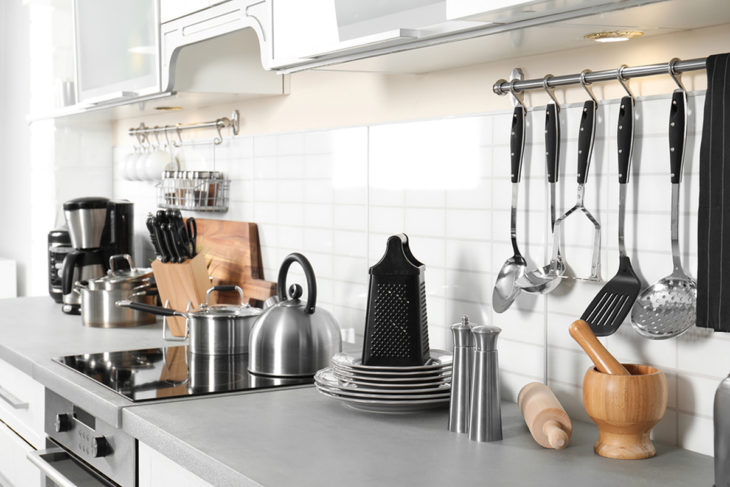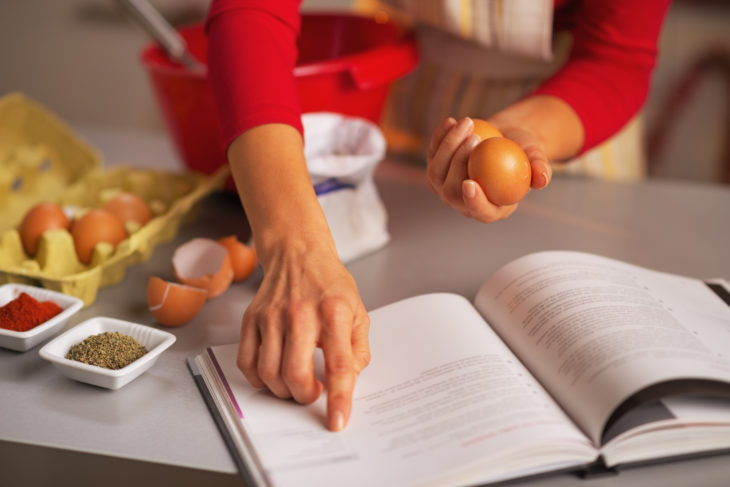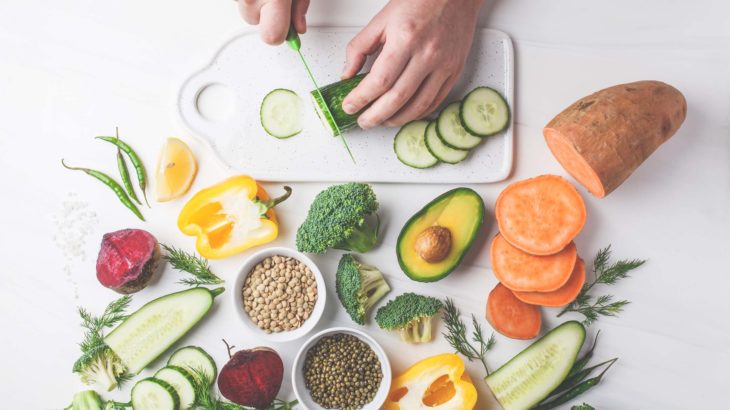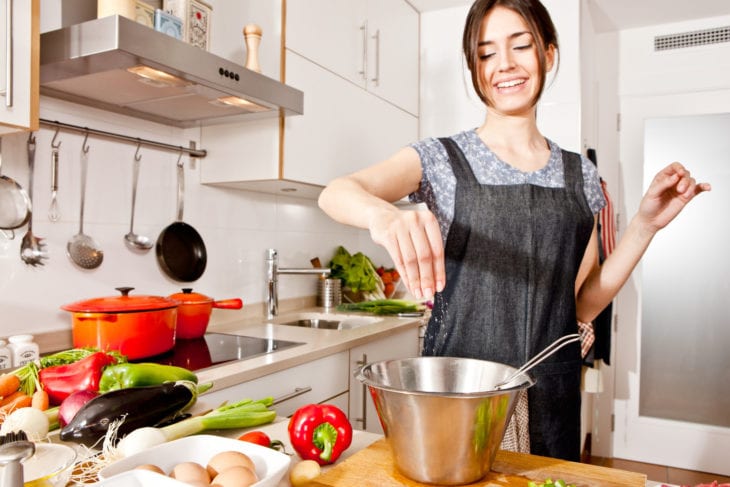Everybody wants to be a cook. If you clicked on this article, it probably applies to you as well.
I’ll start us off by sharing some of my personal journey when it comes to wanting to become a better cook and actually working towards that goal. Like a lot of people, I only really started cooking for myself in college, when I was living on my own and doing all the grocery shopping.
Back then, the name of the game was finding simple, quick meals that weren’t all that adventurous but would still make for a satisfying dining experience.
At most, I had about three different things that I could cook, and one of those was just pasta covered with store-bought sauce. I definitely wasn’t losing sleep over the complexity of these meals.
Rather than noticing the general unhealthy quality of these same few meals over time, I just got bored with them. Instead of gathering up enough motivation to actually research healthy cooking habits and open my mind to more complicated cooking processes, I stuck by my same old mainstays for a long time.
After hopping around to a few different apartments, each with its own slightly more advanced kitchen and cooking area, I slowly started to do my research.
But one of the big problems was simply the sheer amount of culinary resources online. I know that sounds like a pretty good problem to have, but there seemed to be a large gap between ultra-simple meals that I was already familiar with and far more involved dishes that would require hours of prep time or overnight marinades and high-end gear just to complete.
After many months of experimenting with new recipes, I found a few that appealed to both my taste buds and my middling-to-bad culinary skills.
This very long search for resources that could help me, a pretty average cook, improve and up my game sparked an idea for an article, one that would offer practical, accessible tips and advice for home cooks looking to take things to the next level.
Cue Stefano Chiarugi, an eminent professional chef with years of experience in high-class restaurants across Europe and the US. At the moment, Chiarugi is preparing for the opening of Ecce-llente!, an innovative Italian restaurant in downtown Sacramento.
Chiarugi also spent years in the Las Vegas food scene as executive sous chef for banquets and head chef at Switch. Back in his native Italy, he was the owner and executive chef of La Cala del Ghiotto in Tuscany, and the list goes on and on.
When I contacted Chiarugi with the idea for this piece, he was immediately excited and started sketching out different areas and subjects to focus on.
The result is a straightforward, easy to understand guide to ways in which you can practice and improve your cooking skills at home so that your meals are more satisfying and more healthy.
Feel free to make pen-and-paper notes of specific tips that you’d like to keep in mind or bookmark this page so that you can easily refer to it later.
With all that said, let’s get started by talking about essential gear for the home cook aspiring to become a home chef.
Contents
Essential gear

Source: cleangreensimple
Ok, so one thing we need to make completely clear before getting into kitchen gear (which can become very expensive indeed) is that many items you see in your local culinary goods store will only be useful to those who actually need them.
This applies most heavily to the glut of “kitchen gadgets,” many of which have hyper-specific uses that don’t really justify their cost for most home cooks.
Strawberry hullers are great for someone who does a lot of work with fruit (and specifically strawberries), but it’s not going to make anyone’s list of absolute essentials.
Stefano has his own list of items that he couldn’t live without:
“I could not do without a good Robot Coupe, a nice oven, and very sharp knives.”
When it comes to the oven, many people are stuck with the one that was already in their home when they moved in. Again, take a minute to decide whether your oven and its performance fit your needs. Does it preheat in a reasonable amount of time? Does the self-cleaning function actually work? Do you ever find yourself delaying meals for your dinner guests because it just hasn’t cooked everything through yet?
If you’ve been having problems with your oven, you may be able to hire a technician to take a look, rather than shelling out for a brand new oven.
A good set of knives is a must-have for everyone, even if you’re only creating big meals every so often. You can try to get by with just one solid kitchen knife, but it’s going to get full very quickly and there will be plenty of situations where you need a different size or cutting edge.
If at all possible, save up to buy a knife set costing $100 or more. If shopping online, check reviews. If shopping in-store, ask questions of the employees and do your best to communicate your cooking needs.
Recipe books vs. online recipes

Source: harvard
Now we come to the subject of recipes, the topic that gave me so much grief years ago. So are online recipes a good source for new ideas and dishes?
In Chiarugi’s opinion, not so much, but there is a clear alternative.
“Generally, I do not recommend following recipes online but I recommend everyone to buy good professional books.”
It’s very easy to find professional cookbooks that focus on just about any type of food you can imagine.
In most cases, it’s helpful to take note of which cookbooks professional chefs use themselves.
As always, keep in mind the kind of cooking you’d like to do and go from there. Thankfully, these cookbooks don’t tend to get terribly expensive, so you might want to buy a few and learn over time which ones are most helpful to you based on your preferred culinary style.
Buying in-season ingredients

Source: Healthline
Culinary professionals have differing opinions when it comes to the proliferation of “organic foods culture,” especially when those foods and ingredients aren’t always readily available to the general public.
But when the conversation swings around to the use of in-season produce, there’s no real debate, and Chiarugi agrees.
“Buying genuine and seasonal products is always a good way to live and cook, and it also helps us to understand the true seasonality of the products we’re using. It’s definitely a helpful habit for amateur cooks and professional chefs alike.”
If you’ve already been to a high-end restaurant, then you already know that their menus rotate and are always seasonal.
We know now that using seasonal produce doesn’t just make for higher quality and better taste, it’s also a much more sustainable model, reducing the need to ship ingredients in from other countries or territories where they are in season.
There are many online guides that break down which produce is in season when based on where you live. Keeping this in mind when you’re shopping or just looking for new recipes can really help improve your meals and make your eating habits more sustainable.
Your kitchen is your laboratory

Source: viralbharat
Before we wrap things up, let’s talk about recontextualizing your home kitchen as a place where you can be adventurous and experiment with new ideas. You can check them here.
Even Chiarugi sees his home kitchen as a kind of oasis where he can be much more adventurous than he could be while at work.
“When I am at home, cooking for myself and my friends, I feel much more free to try new recipes. My friends can be my critics, giving me feedback on these creations. The home is an excellent laboratory where you can create and then refine and perfect recipes.”
If you’re just starting out in the culinary arts, you may not want to subject your friends to your experiments quite yet, but once you’ve found a few recipes that work well for your cooking style and your schedule, sharing those creations with people you care about can become an even greater motivator for future experimentation.
Over time, you’ll start to see your home kitchen as a kind of laboratory. It should be a fun space where you feel able to try new things that you never would have imagined attempting just a few years ago.
Becoming comfortable in the kitchen is about much more than just learning new techniques and being able to work efficiently. It’s about teaching yourself an incredibly valuable skill that can be used for many, many years to come.
Every single person has very different preferences regarding what they like to cook and what they like to eat. Instead of comparing yourself to culinary professionals who have had years of training and experience, try to compare your meals to the ones you made in the past.
Are these meals more colorful, more flavorful, more interesting? Have you grown to love both cooking and eating a little bit more?
If you arrive at a yes, then it’s all been worth it.
